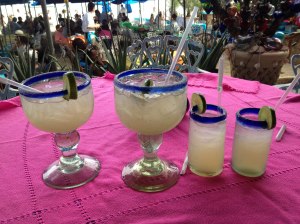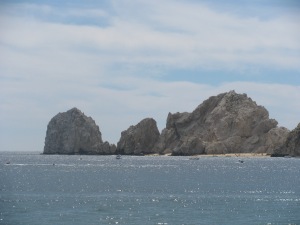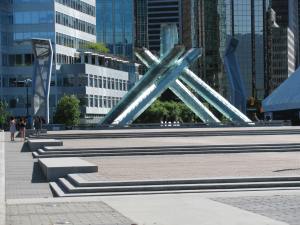I used to go to Mexico every year with my mom, but then it got less safe so for the past several years we’ve chosen domestic destinations. I miss Mexico. I love exploring, speaking Spanish, eating, basking in the sun…. So, when the opportunity arose to go on vacation with my boyfriend, Tony, I immediately thought of Mexico. We were both longing to escape Winter in Seattle (cold and dark) and he had a new passport burning a hole in his pocket. Since we didn’t have much time, I figured Cabo would be a good choice – not too far, beautiful weather and pretty touristy. I can be a bit of a travel snob and when foreign menus list prices in dollars it is annoying… however, when your goal is relaxing and reconnecting with the sun it isn’t crucial to be in authentic Mexico. Besides, traveling with a chick in a chair is pretty challenging, so I figured I’d ease Tony in. I made the assumption that as a huge tourist destination and cruise ship port, Cabo would be pretty accessible… sadly, not the case. For that reason, while MUCH more went right than wrong on our trip, I have some things to figure out before returning there.
Once we chose Cabo, we booked our flights. Flights cost more than I’d anticipated, but our dates weren’t flexible so we had to take what we could get. I did make two decisions that turned out to be excellent ones: #1 On the flight down, we changed planes in San Diego, which is a small airport and way easier to navigate than, say, LAX; and #2 I paid a little more for a nonstop return flight. I thought it would be nice to fly straight home, which of course it was, but I’d forgotten that you have to go through Customs wherever you land first, so we didn’t have to do that until Seattle. Sweet!
Then, it was time to book a hotel. This is where things got a little frustrating. I had a hotel in mind (Hotel Finisterra), and they were even running a sale but… come to find out, none of their rooms are accessible. I searched on http://www.tripadvisor.com/ and http://www.hotels.com/, e-mailed several hotels and called others… and I couldn’t find a hotel with an accessible room for under $350/night! Ridiculous. Unlike the rest of the universe, I can’t use bidding websites like Priceline.com because there is no way to determine accessibility before paying. So I kept looking, and maybe panicking a little, and my mental pricepoint kept inching up… finally, I found a room at the Pueblo Bonito Rosé, a resort right on the beach. It was pricey but I got a good deal and it wasn’t going to bankrupt us. I took care to call them directly to ensure the accessible room and I exchanged several e-mails so I got the guarantee in writing.
For the rest of the trip: I got a steal on an airport shuttle through Cabo Transfers (http://caboairporttransfers.com/), researched restaurants (Trapper’s List, http://trapperscabolist.com/, is really good) and read up on Cabo and suggestions from fellow travelers (http://www.tripadvisor.com/ has a wealth of information).
I found several disability-specific websites:
http://www.cabowaterlimos.com/, or Deliro Water Limos, which run accessible boats for whale-watching, sunset cruises, etc. (I was super excited about this one, but they did not respond to my e-mails and we couldn’t locate them in Cabo. I assume they are defunct.)
http://cabomobility.com/, for accessible airport transportation and equipment rental (I contacted them for an airport transportation quote and for advice on where to get a beach wheelchair. After four e-mails they responded “Unfortunately we cannot provide the service.” Sigh.)
http://abilitytrip.com/, which has a Cabo page with some general travel access info. (Interesting but brief and not super-informative.)
http://www.bajaenterprises.com/index.html, an accessible sport fishing company (I didn’t contact them.)
http://www.specialneedsatsea.com/, a company who does equipment rental across the globe (I thought about contacting them re: a beach wheelchair rental but I never did.)
As you can see, not an overly successful web search.
And then, finally, departure day had arrived! The trip down was pretty uneventful – one of my wheelchair brakes did get bent on the trip to and/or from the luggage compartment, but Tony managed to bend it back. Once in Cabo, we exchanged $40 at the rip-off airport currency exchange (they gave 10.24 when the actual rate was more like 12.5) to give us a few pesos to start with. We found our shuttle driver easily, and he even let me sit up front in the van which is easier than trying to navigate the back. 45 minutes later, we were at the Pueblo Bonito Rosé.
Check-in went quite smoothly until… as we were being handed our key, I nonchalantly said, “that’s the wheelchair room?” Without missing a beat, the clerk told us there were no such rooms available. Uh-oh. We showed her the e-mails I had exchanged with the hotel guaranteeing me a “handicap” room. We were then told there would be an appropriate room on Monday (in two days) but that we would need to stay in the other room until then. The clerk was polite, but I do not think she understood my distress until I said, “how am I going to go to the bathroom until then?” Finally, it seemed to dawn on her that we really needed an accessible room. After looking again at the e-mails, and discussing the situation with her colleagues (in Spanish, which I’m sure she thought I couldn’t understand), she announced that she was moving us next door to the Pueblo Bonito Blanco, where there was a disability room available. The new room was fine, and it was accessible. However, there was no roll-in shower (which I don’t critically need but it was one of the things I was promised) and the Rosé is more wheelchair-friendly in some aspects. I’m just glad I had everything in writing, or I suspect they would not have offered to move us, even though the other room was just sitting vacant!
Since returning, I have contacted the hotel to discuss the situation, but I have not received a response as yet. So I can tell you that Room 105 at the PB Blanco is accessible, with a lowered peephole, lowered hangers, grab bar by the toilet and grab bars in the bathtub/shower, and that the beds (2 doubles) are tall and you will need a companion to reach the thermostat and the dishes in the kitchenette (which are stored in high cabinets), but I cannot tell you how to safely book it. On my next trip to Cabo, I will probably stay elsewhere, where I can be sure to get the right room (although I am not sure what more I could have done). Besides, one of the great things about most of the PB hotels is that they are right on the beach, but since we had no view or beach wheelchair, we couldn’t take advantage of this (Tony walked on the beach a few times but the beach is public, so I suppose he could have done this anyway).
So, moving on… on the bright side, since we had an outside entrance at the Blanco (at the Rosé you go in through the lobby), we didn’t have to deal with any time share nonsense. Bonus! And the Blanco has flamingos.
General accessibility/travel tips for Cabo:
We weren’t far from town, although the roads weren’t particularly good getting there and everything takes longer with a wheelchair. Be prepared for some dirt roads and potholes, and wheeling in the street when necessary. We didn’t take taxis although perhaps the first night when we had groceries a taxi would have been smart. There are inconsistent curb cuts in Cabo, and many restaurants have stairs but if you look around you are likely to find steep, narrow ramps – Tony pointed out that these are not likely built for wheelchairs or strollers, but rather for handcarts carrying alcohol or food… I’m sure that’s true, but they work just the same (as long as someone can push – they are really steep). 🙂
The Marin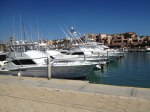 a is the best, most level place to wheel around in Cabo, however the food is touristy and pricey, so I’d advise eating elsewhere most of the time. There are shopping stalls and excursion hawkers all along, so get used to saying “no, gracias” or just keep walking. I did not find it to be too intrusive. Tony said the vendors on the beach were a tad more aggressive. If you walk down the west side of the marina, you will find a nice large covered store with t-shirts and other souvenirs for sale – this was
a is the best, most level place to wheel around in Cabo, however the food is touristy and pricey, so I’d advise eating elsewhere most of the time. There are shopping stalls and excursion hawkers all along, so get used to saying “no, gracias” or just keep walking. I did not find it to be too intrusive. Tony said the vendors on the beach were a tad more aggressive. If you walk down the west side of the marina, you will find a nice large covered store with t-shirts and other souvenirs for sale – this was 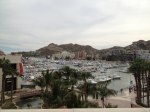 perfect for us, since we aren’t big shoppers and just wanted to pick up a few things. If you do love to shop and bargain, there are stalls/small shops all over downtown and the marina, or you could venture into San Jose del Cabo, which is by reputation quieter and has more quality shopping.
perfect for us, since we aren’t big shoppers and just wanted to pick up a few things. If you do love to shop and bargain, there are stalls/small shops all over downtown and the marina, or you could venture into San Jose del Cabo, which is by reputation quieter and has more quality shopping.
The best maps I found: http://loscabosguide.com/maps/cslmap.htm and http://loscabosguide.com/maps/dwntwncsl.htm, which I printed out and brought with us. There are links to more maps at the bottom of these pages. Trapper’s List ( http://trapperscabolist.com/) also has good maps with restaurant listings. Tony was initially surprised that I was relying on paper maps in the 21st Century, but he soon warmed up to the idea.
Which segues into… Internet access in Cabo is poor and expensive. Even the Internet cafés are expensive. We got decent free WiFi at the Mall Puerto Paraiso on the marina.
Restrooms: This is a constant concern when I travel. I had assumed that given the cruise ships that go through Cabo, some of the restaurants (at least on the marina) would have accessible restrooms. Well, while I didn’t do an extensive search, I found no restaurants with accessible restrooms, and only one public accessible restroom. The latter was at the southwest end of the marina, near the shopping center by Senor Frog’s. A tip buys you gratitude and toilet paper, and since the only change I had was a 10 peso coin, that’s what I paid. The restroom was clean and fully accessible. Pretty much the best 80¢ I ever spent. A note of caution – the restrooms at Puerto Paraiso mall sport the wheelchair symbol, however in spite of being plenty large enough, the disabled stalls have no grab bars. *sigh*
Money: We exchanged $40 at the airport exchange to give us a head start (they gave us a poor exchange rate, though, and they took forever), and then got most of our pesos from an ATM at the Banco Santander at Plaza Arámburo, on Lázaro Cárdenas between Zaragoza and Ocampo. It’s a small plaza with a parking lot, motel and grocery store. Bank of America has an agreement with Santander so they do not charge ATM fees for BoA customers. [I dislike BoA but I opened a small travel account there for this purpose; BoA also has agreements with banks in France, Germany, China, etc.] The ATMs are in Spanish but it’s pretty easy (“retiro” is “withdrawal”) and they give money in pesos – try asking for an odd amount so that you don’t get only large bills. ATMs are going to be your best bet for an optimal exchange rate, and are safer than “currency exchange” storefronts. They are also open 24 hours, so you don’t have to wait for a bank. Everywhere took pesos, and several places took dollars and/or credit cards. Twice, the item would actually have been cheaper if we’d paid with dollars, but I pretty stubbornly stuck to pesos. I did take about 10 $1 bills, which came in handy on the last day of our trip, to use for tips when our pesos were gone.
Restaurants: Let’s be honest, food is very important to me when I travel. So here’s a culinary rundown. Most of the restaurants can be found at http://trapperscabolist.com/.
Groceries – the room had a reasonably well-equipped kitchenette, which we decided to take advantage of by buying some groceries and eating most of our breakfasts in. Some travelers go to Costco or Walmart for this, but for only two people that felt a little excessive. Besides, it was our chance to support a local business. We went to the grocery store in the same plaza as Banco Santander, and bought eggs, cheese, tortillas, coke, beer, water, etc…. Another tip – I brought ground coffee, Crystal Light, and a few Sweet n Low packets from home.
Desperados – on Morelos/Niños Héroes (one blk from Cárdenas). We had dinner here – good food, touristy, reasonable but not great prices. They did give us a free drink. 🙂
Mango Cantina – on the marina, we had a yummy but expensive drink here. They are related to Mango Deck, a beach bar on Playa Medano.
Gordo Lele’s – on Matamoros one blk from Cárdenas. Tiny place plastered with Beatles memorabilia and featuring a bottle of hand sanitizer on each table. Gordo himself is in the kitchen. Eat in or take out. Cheap. Some of the best tacos I’ve ever had! The seafood was my favorite. Next time, I want to try a torta (sandwich).
Baja Brewing Co – on the marina, by Puerto Paraiso mall. The only microbrewery in Cabo. Tony had beer, I had a microbrew rootbeer float.
Happy Endings – open-air bar on Marina Boulevard near the Pink Kitty. We had drinks here – it was okay. I bet it livens up the later it gets. The bill would have been cheaper in dollars, but we paid pesos anyway.
Giggling Marlin – bar on Marina Blvd and Matamoros. Touristy, with audience-participation games starting at 7PM. It was fun, the staff seemed to be enjoying themselves, and it was the best $5 margarita I had in Cabo!
Señor Sweets – café on the north part of the marina. Decent smoothie.
Mama’s Royal – up Hidalgo 1.5 blocks from Marina Blvd. This was our one breakfast out, and rivaled for our best meal of the trip. So. Good.
The Office – beach bar on Playa Medano. The strongest margaritas I’ve had in my life – and they were 2×1. One sip, and we gladly decided to buy the overpriced (but delicious) guacamole appetizer. 🙂
Gardenias – behind McDonald’s on Camino Hacienda. Fabulous, deceptively simple tacos.
So, the trip was great overall. Good food, beautiful weather, superb company. We spent time relaxing in the room (our leisurely breakfasts *in* were fantastic) and meandering around the marina. On a future trip, I’d like to hang out more by the pool and maybe go on an excursion, like whale watching (although excursions are expensive). The most important thing to figure out for the future, however, is how/where to get a guaranteed accessible, reasonably priced hotel room. To be continued… 🙂



